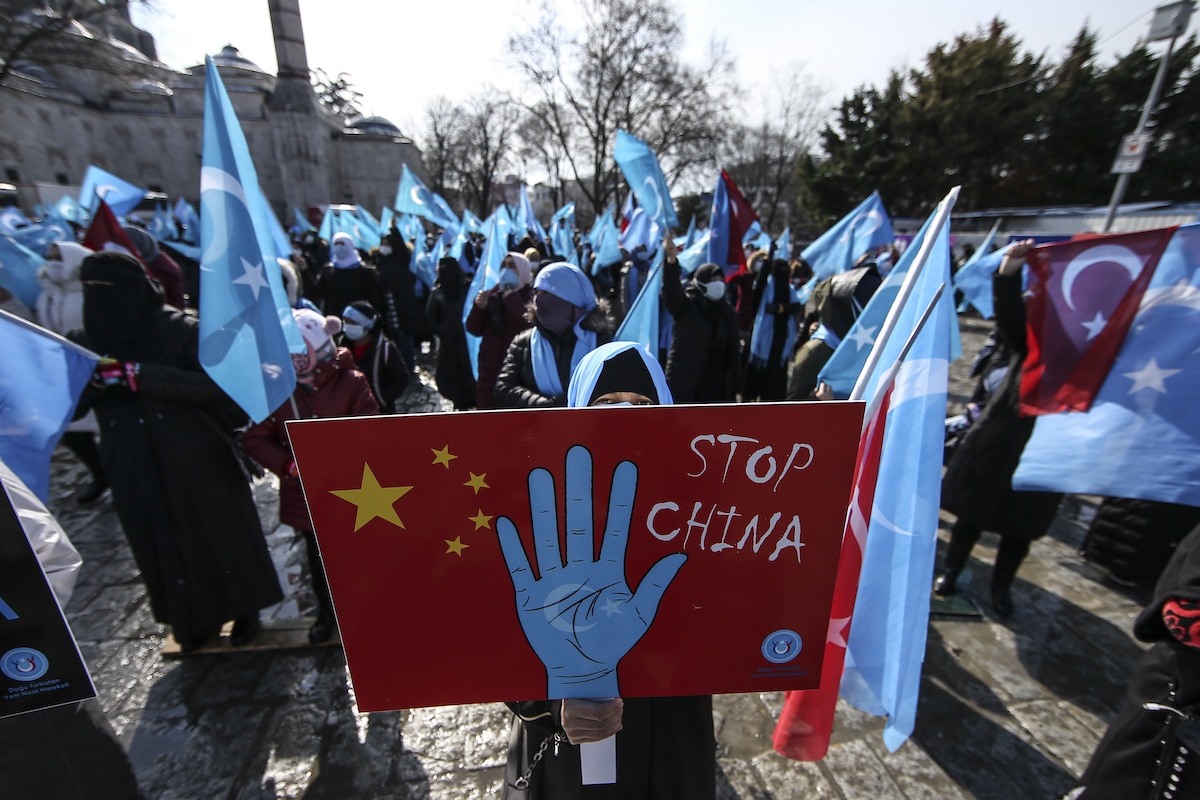Under Xi Jinping, the People’s Republic of China (PRC) has returned to its Maoist past. Both Xi and Mao Zedong promoted party and especially personal rule. Both sought to extinguish even the hint of dissent. Both also attempted to eradicate perceived foreign influence, especially involving religious faith. The major difference between them, however, is Xi’s commitment to order. Mao’s final largescale atrocity was unleashing violent chaos through the Great Proletarian Cultural Revolution. Xi’s family suffered during that period, which he has criticized. The lesson he evidently learned was that brutal repression, though necessary, should be carefully controlled.
Under Xi, the Chinese Communist Party (CCP) has steadily beaten the population into ideological conformity. For ethnic and religious minorities, that has meant erasing their identities and remaking them as Han Chinese. Most far-reaching has been the campaign against the Muslim Uyghurs, a Turkic people in the Xinjiang Uyghur Autonomous Region (XUAR).
Beijing claims to be targeting separatists and terrorists. Although there were violent attacks from some separatists in the past, none justified the far-reaching campaign of repression initiated by the Beijing authorities. The result is a nightmare out of George Orwell’s 1984: “surveillance cameras about every 150 feet, monitoring people’s faces and daily routines. Mobile police checkpoints popped up at random throughout the region, leading to long lines on public roads. At the checkpoints, and sometimes randomly on the street, police officers stopped people to ask for their ID cards and occasionally demanded to plug unidentified electronic devices into cellphones to scan them without explanation.”
Even worse is the incarceration of more than a million Uyghurs in reeducation camps. The latter’s purpose is also Orwellian—to produce CCP-controlled automatons. Even after release, many Uyghurs are not free. The Australian Strategic Policy Institute found that “under conditions that strongly suggest forced labor, Uyghurs are working in factories that are in the supply chains of at least 83 well-known global brands in the technology, clothing and automotive sectors, including Apple, BMW, Gap, Huawei, Nike, Samsung, Sony and Volkswagen.”
The authorities define guilt broadly. Lindsay Maizland offers this:
Most people in the camps have never been charged with crimes and have no legal avenues to challenge their detentions. The detainees seem to have been targeted for a variety of reasons, according to media reports, including traveling to or contacting people from any of the twenty-six countries China considers sensitive, such as Turkey and Afghanistan; attending services at mosques; having more than three children; and sending texts containing Quranic verses. Often, their only crime is being Muslim, human rights groups say, adding that many Uyghurs have been labeled as extremists simply for practicing their religion.
Official Chinese denials have been undercut by leaks of official documents. Reported the New York Times: “Even as the government presented its efforts in Xinjiang to the public as benevolent and unexceptional, it discussed and organized a ruthless and extraordinary campaign in these internal communications. Senior party leaders are recorded ordering drastic and urgent action against extremist violence, including the mass detentions, and discussing the consequences with cool detachment.”
This repression has generally been directed inward. However, Beijing is also determined to control Uyghurs who escape abroad. A new report by Bradley Jardine, a fellow with both the Wilson Center and the Kennan Institute, explores how China is exporting repression abroad, including into the United States. The CCP’s reach is long, having “engaged in transnational repression in 44 countries since 1997.” Beijing is not alone in this practice, but it is the most prolific practitioner.
The threat is multifaceted. Jardine found “5,532 cases of Uyghurs facing intimidation, 1,150 cases of Uyghurs detained in their host country and 424 cases of Uyghurs deported, extradited, or rendered back to China.” He believes many cases go unreported, however.
Jardine details many instances of Chinese repression. For instance, a couple of cases pulled at random involve Central Asia:
In 2017, Chinese police called Seyit’akhun Abdukerim, a Uyghur trader in Kyrgyzstan, back to his hometown of Atush in the XUAR. He heeded the call and was arrested upon his arrival. The police demanded that he call his sons, studying abroad in Egypt, to demand their return to the Uyghur region. Abdukerim was then sentenced to 18 years in prison for having sent his children abroad. Imran and Madina Hekimjan, and Ilham Qari, relatives of Abdukerim and his sons, were likewise summoned back to the XUAR from their studies in Egypt. Like their relatives, China’s government detained and later imprisoned them. Ilham Qari was later reported to have died in one of the camps.
There are many, many more such examples.
The worst abuses are when the PRC recaptures those who have fled abroad, with intimidation also occurring from afar. Even émigrés safe from extradition/rendition, as in America, are at risk from “a much broader use of ‘everyday’ tactics, including digital threats, phishing attacks, malware, and coercion via threats to relatives in the XUAR.”
Jardine finds that most trends are moving in the wrong direction. First, various forms of intimidation are increasing. And China can rely upon a gaggle of state agencies as well as foreign institutions: “The web of institutions and frameworks used to enact these policies includes Interpol; bilateral extradition treaties; the Shanghai Cooperation Organization; the United Front Work Department; the Ministry of Public Security; the Ministry of State Security; the Political and Legal Affairs Commission; the Xinjiang Public Security Bureau; and China’s consulates and embassies overseas.”
Second, it has become harder for Uyghurs to find refuge elsewhere. The PRC has used its economic leverage and expanded its influence in Central Asia and North Africa, making both transit and residence more difficult. Jardine notes that “the BRI’s [Belt and Road Initiative] emphasis on trans-Eurasian connectivity has given China an unprecedented degree of influence in places where it was previously limited” such as the Middle East and North Africa (MENA). Recent approval of an extradition treaty between Beijing and Ankara has driven some Uyghurs from Turkey.
Third, China is using new technologies to expand harassment of Uyghur expatriates. For instance, “China’s tech companies are expanding their activities in strategic regions such as Central and South Asia and the MENA region, putting Uyghurs at risk of transnational surveillance. Under ‘smart cities’ programs, companies engaged in racial profiling of Uyghurs in the XUAR are now integrating Eurasian capitals within China’s ‘Digital Silk Road’ project.”
Fourth, Jardine warns that “less severe forms of transnational repression are often a precursor to harsher methods.” Such practices can marginalize Uyghurs in their adopted countries, leaving them more vulnerable to greater coercion. This highlights the importance of countering “intimidation, threats, and enforced statelessness” as well as renditions/extraditions.
Fifth, the PRC usually works with foreign accomplices. The report concludes that “the most common form of physical transnational repression involves exploiting domestic and international institutions to detain or deport Uyghurs unlawfully at China’s request.” Examples include “evidence of Chinese intelligence using Dubai as a base of operations, MSS officers present in Egyptian prison facilities and college campuses, and a growing security presence on Tajikistan’s territory.”
Halting or at least mitigating the mistreatment of Uyghurs in China remains extraordinarily difficult. Only rarely do governments make serious political concessions in response to foreign pressure. Washington’s high-profile sanctions campaigns have uniformly failed in this regard. The U.S. is also dealing with Beijing over many other complicated economic and geopolitical issues, including the Russo-Ukraine war, North Korea’s nuclear program, military threats against Taiwan, trade and supply chains, and other human rights concerns.
However, the U.S. and other nations have a special obligation to rebuff Chinese interference on their territory and against their citizens. Jardine urges governments to increase immigration opportunities for Uyghurs, expose Chinese activities, make it easier for Uyghurs to report Chinese abuses, and limit the export of surveillance software and technology.
These would be a good start. The U.S. should also directly confront the PRC over such activities, which violate the latter’s purported opposition to foreign intervention. Working with Europe and other concerned states, Washington should promote a multinational coalition to threaten retaliation, including targeted economic sanctions, expulsion of Chinese personnel, and other actions designed to deter Beijing.
Moreover, people of goodwill should not wait on the U.S. or other governments. Protests and boycotts could help embarrass Chinese officials and undermine the PRC’s reputation. Beijing should understand that it will pay a significant price for its malign treatment of the Uyghurs.
Mao killed prodigiously, while Xi relies on imprisonment. However, their determination to sacrifice everyone and everything to their rule is similar. Now Xi is exporting his tyrannical practices “through intimidation, harassment, surveillance, detentions, extraditions, and renditions.” Americans must reject this malign Chinese export.

